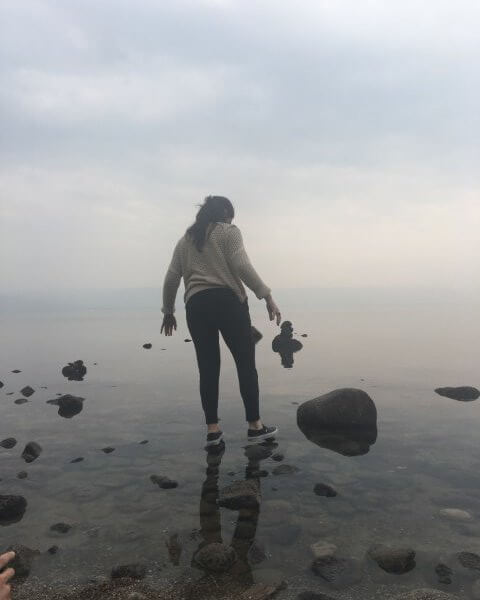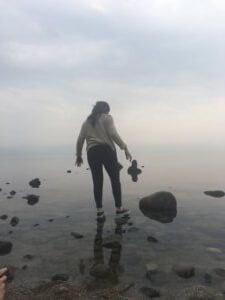
God Is Not the Storm
This past week, we re-opened the church office. We’re following our careful reopening plan, screening ourselves and each other for symptoms, using our contactless thermometer to confirm we don’t have fevers (100.3 is the magic number!), and making sure we complete the contact tracing log for everyone who comes in.
 We have a check-in station in the office, with hand sanitizer, wipes, not one but TWO contactless thermometers, extra masks, and the contact tracing log. We’ve posted all our COVID informational signs — and our ReGathering Covenant — on the doors where we can all see them, and we have a thoughtful office plan that keeps us working together, but at a distance. We’re getting the hang of this. It is our new normal.
We have a check-in station in the office, with hand sanitizer, wipes, not one but TWO contactless thermometers, extra masks, and the contact tracing log. We’ve posted all our COVID informational signs — and our ReGathering Covenant — on the doors where we can all see them, and we have a thoughtful office plan that keeps us working together, but at a distance. We’re getting the hang of this. It is our new normal.
But still — has this ever happened to anyone else? — three times this last week, I’ve had to run back inside the house to get my mask when I’m headed over to the church. And at least a couple of times a day, I’ll look at Annie, or Deb, or Maggie — or catch a glimpse of myself in a window, and I’m suddenly startled — WHO IS THAT MASKED PERSON? And how did this get to be real? Even though this is our new normal, it’s still strange.
And reading or watching the news, with the awful explosion at the port in Beirut this past week, the Air India plane crash, shark sightings as close to us as Cape Cod, and the devastating path of Isaias from the Bahamas all the way up the coast through New England — all amidst our rising COVID infection rates in many areas of the country, and our ongoing struggles for human justice and equity, sometimes it’s easy to wonder, Where is God in all of this?
Elijah at Mount Horeb
Can’t you imagine that’s what the Prophet Elijah was wondering? In our Old Testament reading today, Elijah goes to Mount Horeb — well-known in scripture as the place where prophets go to speak to God. Elijah has come out of high drama. We come into the middle of his story here, but he’s been doing battle with King Ahab and his wife, the scary Queen Jezebel of Sidon and all the false prophets they have been keeping around. Elijah proves to the Israelites that Baal is a false god through the stunning miracle of God’s fire that consumed the sacrifice of the bull, even though the wood was wet, and there was a trench of water all around. And then Elijah killed all of Baal’s false prophets, and Jezebel is FURIOUS. She vows that she will kill Elijah the next day.
An angel of the Lord tells Elijah to go to Mount Horeb — a journey of 40 days and 40 nights (that’s ancient Hebrew for a really long walk), where today’s story takes place. As preacher Isaac Villegas writes, when the angel of the Lord told Elijah to go to Mount Horeb, Elijah knew he would encounter God. After all, Horeb was where God spoke to Moses with fire and to Israel with a storm. But for Elijah, God didn’t show up as expected. That day on Mount Horeb, first the wild windstorm came — more fierce and destructive than Isaias this past week — so strong that it was splitting mountains and breaking rocks in pieces before the Lord, Elijah’s story in 1 Kings tells us. But the Lord was not in the wind. After the wind came an earthquake, but the Lord was not in the earthquake; and after the earthquake a fire, but the Lord was not in the fire.
Sound of Sheer Silence
 Probably many of you know this story of Elijah by heart, although you may not recognize the part that would remind you in the translation we use today in church. But you know the phrase “through earthquake, wind, and fire” — those natural disasters that sound like the force majeure clause in your insurance policy. And you know that God is not in the earthquake, wind, and fire, but in what comes next. So here’s Elijah — fresh from all of that trauma and with Jezebel’s death threat ringing in his ears. He winesses the earthquake, wind, and fire — and then comes….
Probably many of you know this story of Elijah by heart, although you may not recognize the part that would remind you in the translation we use today in church. But you know the phrase “through earthquake, wind, and fire” — those natural disasters that sound like the force majeure clause in your insurance policy. And you know that God is not in the earthquake, wind, and fire, but in what comes next. So here’s Elijah — fresh from all of that trauma and with Jezebel’s death threat ringing in his ears. He winesses the earthquake, wind, and fire — and then comes….
Our translation today says the sound of sheer silence. But I think you may recognize the phrase from the King James translation: What comes next was a still small voice. The Lord was not in the violent storm, not in the earthquake, and not in the fire, but in the still small voice. In the sheer silence.
Some of you may know the hymn Dear Lord and Father of Mankind, by American Quaker poet John Greenleaf Whittier. He was from Massachusetts, and did most of his writing not far from Boston. The last stanza of the hymn expresses God’s peace and separateness from the storm and the chaos and the confusion:
Breathe through the heats of our desire
Thy coolness and Thy balm;
Let sense be dumb, let flesh retire;
Speak through the earthquake, wind, and fire,
O still, small voice of calm.
God is NOT the storm, NOT the natural disaster, NOT the pandemic, nor the explosion — but the healing, the compassion, and the quiet — or as the hymn says: the coolness, the balm, and the still, small voice of calm.
Jesus Calms the Storm
In our reading from the Gospel of Matthew today, Jesus, like the Prophet Elijah, has been under growing stress in his earthly ministry. Where our passage starts today, Jesus is still up in Galilee, preaching and teaching in the fishing villages around the Sea. But trouble is brewing. Jesus has just heard that his cousin, John the Baptist, was imprisoned and murdered by King Herod.
Devastated at the news of the Baptist’s murder, and knowing that this doesn’t bode well for his own movement, Jesus goes off by himself in a boat to a remote place — probably to grieve, think, and pray in the quiet. But the crowd, starved for economic justice and healthcare, follows him. He feels compassion for them, teaches them, heals their sick, and then performs the miracle of feeding the 5,000 from five loaves of bread and two fish.
Immediately, Matthew’s gospel says, after feeding the 5,000, Jesus dismisses the crowd, and sends the disciples ahead in the boat to the other side of the Sea, and he went up on a mountainside to pray. He was again looking for some quiet space in the clamor.
 Later that night, when the boat was already a considerable distance across the lake, a great windstorm arises, and the waves begin to swamp the boat. And then Jesus appears, walking along on the water toward the boat, where the disciples were terrified. From his stillness and his calm, Jesus quiets the storm. He brings calm compassion — his non-anxious presence — just as he brought calm compassion to the 5,000 who followed him to his deserted place of prayer in last week’s reading. Jesus’ coolness and his balm, as Whittier’s hymn goes, calms the disciples’ fears. Peter even feels so much better that he wants to try walking on water too! Peter feels that peace for a moment and starts toward Jesus before he gets distracted by the storm again and begins to sink.
Later that night, when the boat was already a considerable distance across the lake, a great windstorm arises, and the waves begin to swamp the boat. And then Jesus appears, walking along on the water toward the boat, where the disciples were terrified. From his stillness and his calm, Jesus quiets the storm. He brings calm compassion — his non-anxious presence — just as he brought calm compassion to the 5,000 who followed him to his deserted place of prayer in last week’s reading. Jesus’ coolness and his balm, as Whittier’s hymn goes, calms the disciples’ fears. Peter even feels so much better that he wants to try walking on water too! Peter feels that peace for a moment and starts toward Jesus before he gets distracted by the storm again and begins to sink.
Why does Peter sink? Why do we get distracted by the storm and begin to wonder where God is and start to sink? As Jesuit priest James Martin says, maybe it’s because when we’re struggling we tend to focus on the area of pain. It’s natural, but it makes it more difficult to see where God might be at work in other places.
So how do we make sure that we hear the still, small voice of calm and don’t get distracted by the earthquake, wind, and fire, wondering where God is?We have to stay connected to God — to that peace which passes all understanding.
Homiletics professor Jan Schnell Rippentropp tells us that we need to have habits and practices that bring us into predictable awareness of the divine. We need to have practices that pull us out of the storm of information, disaster, and stress — the earthquake, wind, fire that is NOT God — so that we can breathe in the Spirit. We need the sacramentality of life—the entrance into and the empowerment to live out our lives in the Spirit. What are these sacramental moments? They’re happening all around us! They come in the “between” spaces of life: kneading dough, tending a garden, or rocking a child, as we take deep breaths into silence. These moments are compelling pop-up reminders of God’s gracious movement in our lives. They remind us of God’s accompaniment on our paths from suffering toward redemption, and compel us toward full life in the Spirit. Amen
